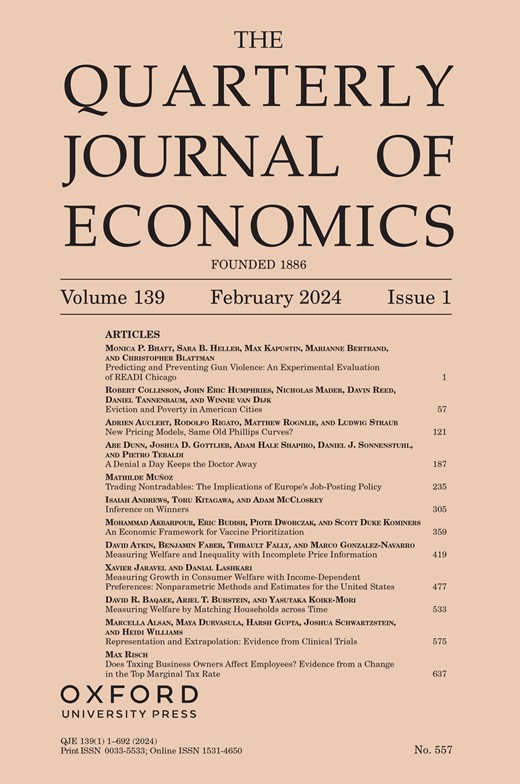Optimal Timing of Policy Announcements in Dynamic Election Campaigns*
IF 12.7
1区 经济学
Q1 ECONOMICS
引用次数: 6
Abstract
We construct a dynamic model of election campaigns. In the model, opportunities for candidates to refine/clarify their policy positions are limited and arrive stochastically along the course of the campaign until the predetermined election date. We show that this simple friction leads to rich and subtle campaign dynamics. We first demonstrate these effects in a series of canonical static models of elections that we extend to dynamic settings, including models with valence and a multi-dimensional policy space. We then present general principles that underlie the results from those models. In particular, we establish that candidates spend a long time using ambiguous language during the election campaign in equilibrium. ∗Kamada: Haas School of Business, University of California, Berkeley, Berkeley, CA 94720, e-mail: y.cam.24@gmail.com. Sugaya: Stanford Graduate School of Business, Stanford, CA, 94305, e-mail: tsugaya@stanford.edu; We thank Ernesto Dal Bo, Itay Fainmesser, Drew Fudenberg, Michihiro Kandori, Akitada Kasahara, Kei Kawai, Fuhito Kojima, David Laibson, John B. Londregan, Shih-En Lu, Francisco Mart́ınez-Mora, Adam H. Meirowitz, Stephen Morris, Kristopher Ramsay, Andrzej Skrzypacz, Ken Shepsle, Yuki Takagi, Satoru Takahashi, and the seminar participants at the Harvard University Department of Economics and Department of Government, the Princeton University Department of Economics and Department of Political Science, University of California, Berkeley, Yale University, the 21st Stony Brook International Conference on Game Theory, and the Urrutia Elejalde Workshop on Information, Dynamics and Political Decision Making for helpful comments. In addition, Steven Callander and Josh Gottlieb read through the previous versions of this paper and gave us very detailed comments, which significantly improved the paper. We also thank the careful reading and suggestions by the Editor and the referees. Judith Levi provided a superb professional editorial assistance, which again significantly improved the paper. We thank Emily Her, Douglas Hong, Omair Butt, and especially Lingxuan Wu for their excellent research assistantship. This paper subsumes and supersedes part of our unpublished working paper “Valence Candidates and Ambiguous Platforms in Policy Announcement Games” and its earlier version circulated as “Policy Announcement Game: Valence Candidates and Ambiguous Policies,” which Sugaya first presented at the 21st Stony Brook International Conference on Game Theory in 2010.动态选举活动中公布政策的最佳时机*
我们构建了一个动态的竞选模型。在该模型中,候选人完善/澄清其政策立场的机会是有限的,并且在竞选过程中随机到达,直到预定的选举日期。我们表明,这种简单的摩擦导致了丰富而微妙的竞选动态。我们首先在一系列规范的静态选举模型中证明了这些影响,这些模型被扩展到动态环境中,包括具有效价和多维政策空间的模型。然后,我们提出了这些模型结果的一般原则。特别是,我们确定,候选人在均衡的竞选活动中花了很长时间使用模棱两可的语言。*Kamada:加州大学伯克利分校哈斯商学院,邮编94720,电子邮箱:y.cam.24@gmail.com.Sugaya:斯坦福大学商学院,加利福尼亚州斯坦福,94305,电子邮件:tsugaya@stanford.edu;我们感谢Ernesto Dal Bo、Itay Fainmesser、Drew Fudenberg、Michihiro Kandori、Akitada Kasahara、Kei Kawai、Fuhito Kojima、David Laibson、John B.Londregan、Shih-En Lu、Francisco Mart́ınez-Mora、Adam H.Meirowitz、Stephen Morris、Kristopher Ramsay、Andrzej Skrzypacz、Ken Shepsle、Yuki Takagi、Satoru Takahashi、,哈佛大学经济系和政府系、普林斯顿大学经济系与政治学系、加州大学伯克利分校、耶鲁大学、第21届石溪国际博弈论会议和Urrutia Elejalde信息研讨会的与会者,动态和政治决策,以获得有用的评论。此外,Steven Callander和Josh Gottlieb通读了本文的前几个版本,并给了我们非常详细的评论,这大大改进了论文。我们也感谢编辑和裁判的仔细阅读和建议。朱迪斯·李维(Judith Levi)提供了出色的专业编辑协助,这再次显著改善了报纸。我们感谢Emily Her、Douglas Hong、Omair Butt,特别是吴凌萱的出色研究协助。本文包含并取代了我们未发表的工作论文《政策公告游戏中的价格候选人和模棱两可的平台》的一部分,以及Sugaya在2010年第21届石溪国际博弈论会议上首次发表的早期版本《政策公告博弈:价格候选人和含糊不清的政策》。
本文章由计算机程序翻译,如有差异,请以英文原文为准。
求助全文
约1分钟内获得全文
求助全文
来源期刊

Quarterly Journal of Economics
ECONOMICS-
CiteScore
24.20
自引率
2.20%
发文量
42
期刊介绍:
The Quarterly Journal of Economics stands as the oldest professional journal of economics in the English language. Published under the editorial guidance of Harvard University's Department of Economics, it comprehensively covers all aspects of the field. Esteemed by professional and academic economists as well as students worldwide, QJE holds unparalleled value in the economic discourse.
 求助内容:
求助内容: 应助结果提醒方式:
应助结果提醒方式:


